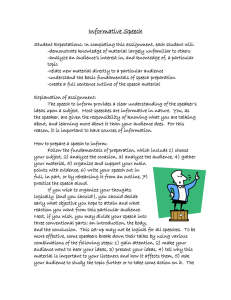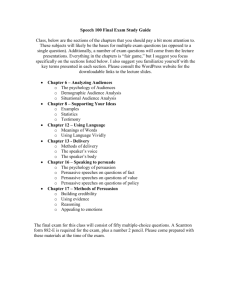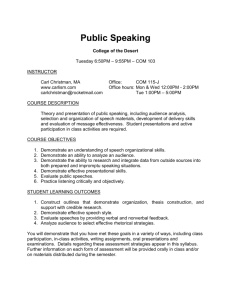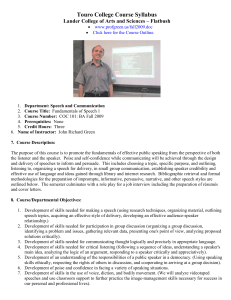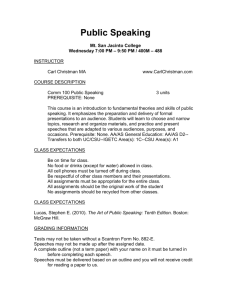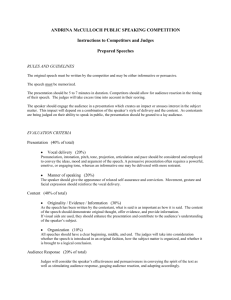COD Speech Monday Wednesday
advertisement
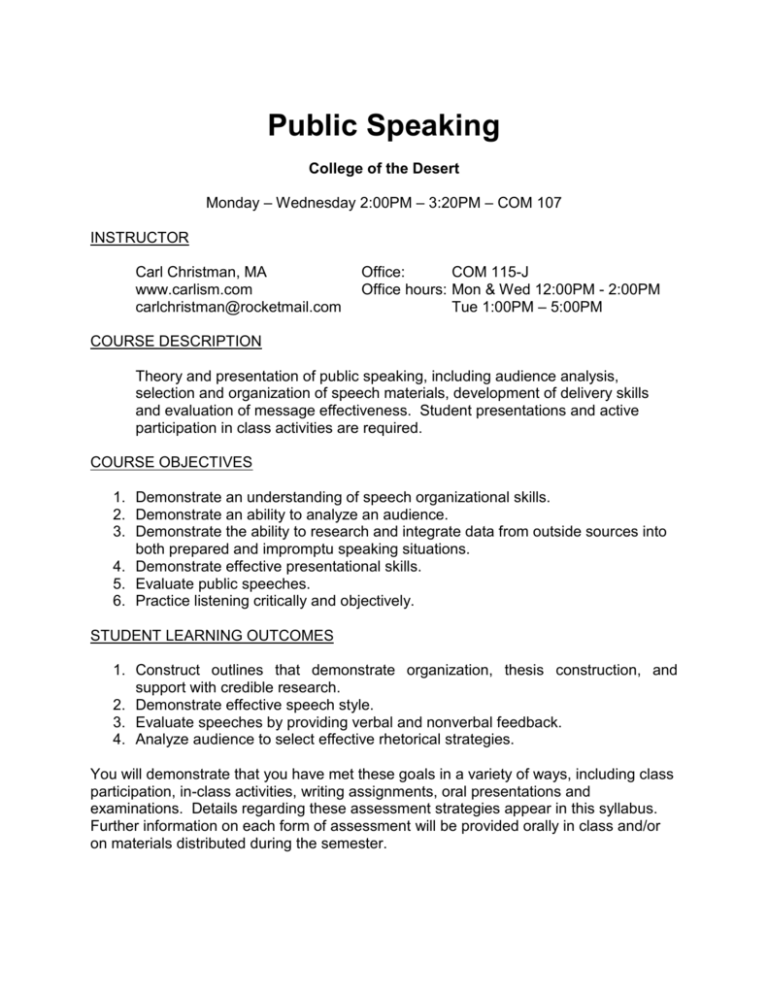
Public Speaking College of the Desert Monday – Wednesday 2:00PM – 3:20PM – COM 107 INSTRUCTOR Carl Christman, MA www.carlism.com carlchristman@rocketmail.com Office: COM 115-J Office hours: Mon & Wed 12:00PM - 2:00PM Tue 1:00PM – 5:00PM COURSE DESCRIPTION Theory and presentation of public speaking, including audience analysis, selection and organization of speech materials, development of delivery skills and evaluation of message effectiveness. Student presentations and active participation in class activities are required. COURSE OBJECTIVES 1. Demonstrate an understanding of speech organizational skills. 2. Demonstrate an ability to analyze an audience. 3. Demonstrate the ability to research and integrate data from outside sources into both prepared and impromptu speaking situations. 4. Demonstrate effective presentational skills. 5. Evaluate public speeches. 6. Practice listening critically and objectively. STUDENT LEARNING OUTCOMES 1. Construct outlines that demonstrate organization, thesis construction, and support with credible research. 2. Demonstrate effective speech style. 3. Evaluate speeches by providing verbal and nonverbal feedback. 4. Analyze audience to select effective rhetorical strategies. You will demonstrate that you have met these goals in a variety of ways, including class participation, in-class activities, writing assignments, oral presentations and examinations. Details regarding these assessment strategies appear in this syllabus. Further information on each form of assessment will be provided orally in class and/or on materials distributed during the semester. REQUIRED TEXT O’Hair, D., Rubenstein, H., & Stewart, R. (2012). A Pocket Guide to Public Speaking (4th edition). Boston: Bedford/St. Martin’s. CLASS EXPECTATIONS Be on time for class. No food or drinks (except for water) allowed in class. All cell phones must be turned off during class. Be respectful of other class members and their presentations. All assignments must be appropriate for the entire class. All assignments should be the original work of the student No assignments should be recycled from other classes. GRADING INFORMATION Tests may not be taken without a Scantron Form No. 882-E. Speeches may not be made up after the assigned date. A complete outline (not a term paper) with your name on it must be turned in before completing each speech. Speeches must be delivered based on an outline and you will not receive credit for reading a paper to us. GRADING CRITERIA Participation Midterm Final test Introductory speech Informative speech Persuasive speech Special occasion speech Impromptu speech Total F = 0%-59% D = 60%-69% C = 70%-79% 10% 15% 15% 5% 15% 15% 15% 10% 100% B = 80%-89% A = 90%-100%100 STUDENTS WITH DISABILITIES: Please let the instructor know if you have a disability that might affect your participation or studies in this class. The instructor will keep this information in strict confidence, of course. If you have not yet contacted DSPS, you should do so very soon since they must identify student-clients prior to providing their services. (760) 773-2534 dspsinfo@collegeofthedesert.edu COURSE OUTLINE Date Topic February 1 February 3 Introduction to class Introduction to communication studies February 8 February 10 Language Language February 15 February 17 Listening skills Nonverbal communication February 22 February 24 Audience analysis Intercultural communication February 29 March 2 Intercultural communication Speech organization Take midterm at www.carlism.com March 7 March 9 Speech delivery & style Visual aids March 14 March 16 Research methods Research methods March 21 March 23 Spring Break Spring Break March 28 March 30 Informative speech Informative speech April 4 April 6 Informative speech Informative speech April 11 April 13 Persuasive theory Logical fallacies April 18 April 20 Argumentation & debate No class April 25 April 27 Persuasive speeches Persuasive speeches May 2 Persuasive speeches May 4 Persuasive speeches May 9 May 11 Special occasion theory Special occasion theory May 16 May 18 Special occasion speech Special occasion speech May 25 2:00PM Impromptu speeches Take final exam at www.carlism.com SPEECH GRADING CRITERIA The following is a set of criteria that will be used for evaluating all speeches delivered in this class. Normally, an “average speech” (C) should meet the following standards: 1. Conform to type assigned (informative, persuasive, ect.) 2. Conform reasonably to the time limit. 3. Exhibit sound organization: a clear purpose adequately supported by main ideas that are easily identified. 4. Fulfill any special requirements of the assignment—such as to use three illustrations, or statistics, or authority. 5. Be intellectually sound in developing a topic of worth with adequate and dependable evidence. 6. Exhibit reasonable directness and communicativeness. 7. Be correct grammatically and in pronunciation and articulation. 8. Be ready for presentation on date assigned. 9. Speaker maintains good audience eye contact. The “better than average” (B) speech should meet the foregoing tests and also: 1. Contain elements of vividness and special interest in its style. 2. Be of more than average stimulative quality in challenging the audience to think or in arousing depth of response. 3. Demonstrate skill in winning understanding of unusually difficult concepts or processes or in winning agreement from auditors initially inclined to disagree with the speaker’s purpose. 4. Establish rapport of a high order through style and delivery which achieve a genuinely communicative response. The “superior speech” (A) not only meets the foregoing standards, but also: 1. Constitutes a genuinely individual contribution by the speaker to the thinking of the audience. 2. Achieves a variety and flexibility of mood and manner suited to the multitude differentiation of thinking and feeling demanded by the subject matter and by the speaker-audience relations. In addition to the above criteria, the following should be considering. The below average (D) speech probably exhibits one of these inadequacies: 1. Does not conform to your assignment or possibly does not adequately meet all criteria required for this assignment. 2. It is poorly times. 3. The central idea and main idea are not completely clear. 4. The supporting material is minimal. 5. Sources are not cited nor adequately identified. 6. Communicativeness is reduced by poor eye contact or some evidence of written style or characteristics of memorization. 7. Some evidence of errors in grammar and/or syntax. 8. Some inadequacies of voice or articulation. 9. The speaker shows little knowledge of his material other than that presented within the time limit. 10. The speaker reveals fallacious reasoning or uncritical acceptance of authorities. 11. Speaker does not make adequate audience eye contact. The unacceptable (F) speech probably exhibits one of these inadequacies: 1. The speech does not conform to the assignment. 2. The preparatory outline and/or speaker’s notes indicate a minimal amount of preparation. 3. The material is taken from one or two sources only. 4. The speaker does not carry out his/her central idea even through the speech may be well organized on paper. 5. The student is unable to answer questions concerning his/her speech or otherwise exhibits grave uncertainty about the material. 6. The speaker reveals serious fallacies in reasoning. 7. Because the speech was memorized, the speaker is uncommunicative. 8. Obviously, the speaker is reading more than speaking. 9. The choice of words and sentence structure are below the level normally expected of a college student. 10. The speech is not communicated because of serious inadequacy in voice or articulation. 11. Speech is read.

